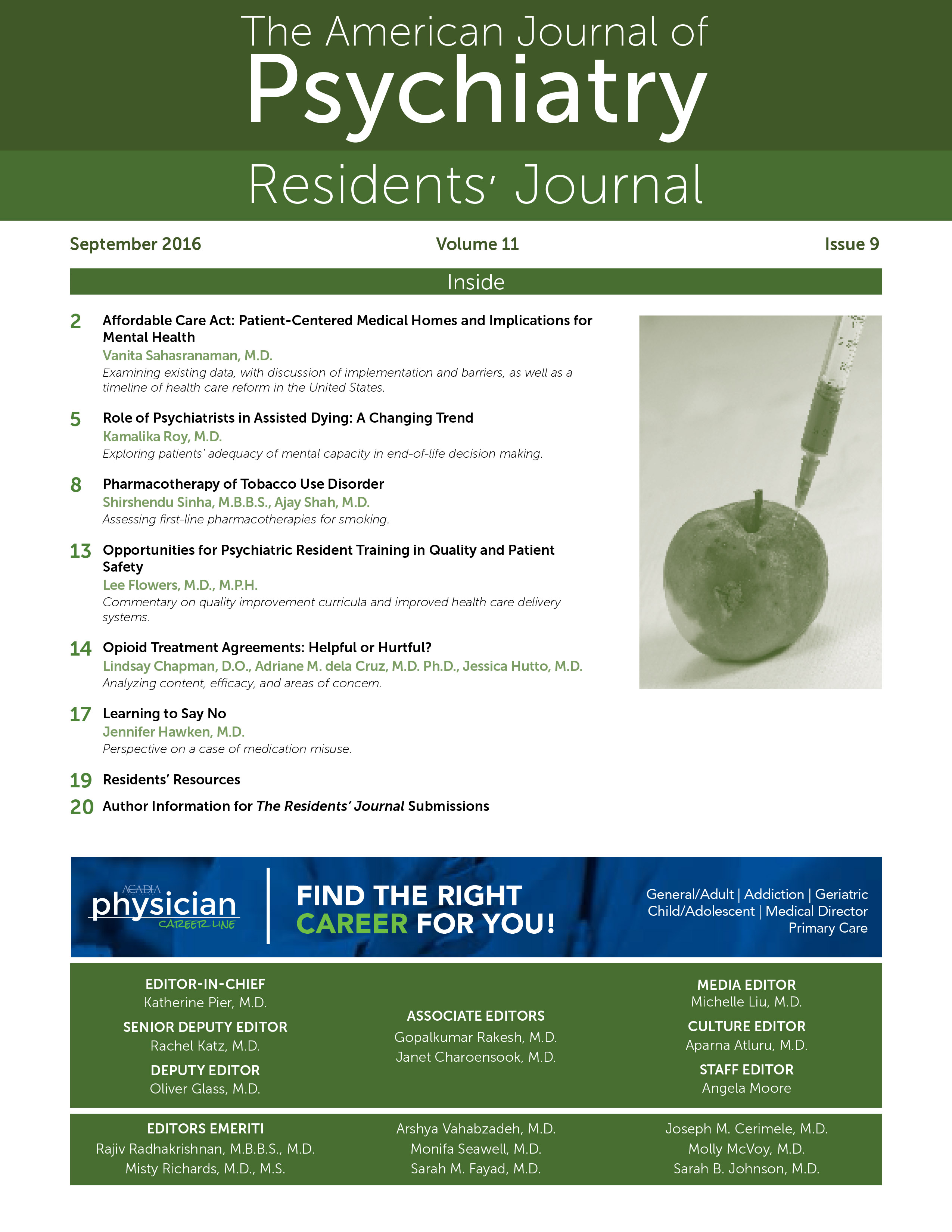Opportunities for Psychiatric Resident Training in Quality and Patient Safety
In August 2015, as a fourth-year psychiatry resident, I participated in a quality and patient safety rotation at the West Haven Veteran Affairs Medical Center. The rotation is part of a new initiative by the Department of Veterans Affairs to create a non-Accreditation Council for Graduate Medical Education (ACGME) accredited fellowship called the Veterans Affairs Chief Resident in Quality and Patient Safety (CRQS) (1). The CRQS position was created to help early-career physicians develop leadership skills and advance quality improvement methodologies to decrease medical errors and increase the quality of care delivered throughout the VA system. In addition to participating directly in multiple clinical care settings, CRQS fellows have substantial roles in trainee education and quality improvement projects for the local VA and Veterans Integrated Service Networks (local regional administrative units). CRQS programs operate separately in internal medicine, surgery, and psychiatry. Nationally, two such programs in psychiatry are active, and six have been designed and are ready for fellows. Leadership development programs, needed in medicine and psychiatry, have proven effective in multiple disciplines (2, 3). Quality improvement curricula, in particular as part of psychiatric training, have been shown to improve knowledge and increase the number of quality improvement projects undertaken by psychiatry trainees (4).
Graduate medical education presents excellent opportunities to further quality care and patient safety in psychiatry. The idea is now coming of age. The ACGME requires residents in training to engage in systems-based practice, practice-based learning, and quality improvement experiences. In Louisiana, Our Lady of the Lake Regional Medical Center had such success in improving both quality of care and quality-related scholarship in the process of becoming an academic center, following ACGME requirements that it open a patient safety and clinical quality improvement fellowship in 2015 (5). Since the Institute of Medicine’s critical report “To Err is Human” (6), the field of medicine has directed much attention to building safer and better health care delivery systems. Errors and gaps in quality care in psychiatry have much in common with other fields in medicine and also much that is unique. Psychiatric patients have unique characteristics, and the nature of inpatient psychiatric care leads to a profile of medical errors that differs from other fields of medicine (7). Psychiatrists, accordingly, need to train in safety and quality in the context of psychiatric care. I hope more psychiatry residents learn about and have the opportunity to benefit from CRQS and related educational opportunities in the field of quality improvement and patient safety. In order to provide patients the best care, psychiatrists must train in and lead in the delivery of safe and reliable health care services.
1. : Chief resident for quality improvement and patient safety: a description. Am J Med 2014; 127:565–568 Crossref, Google Scholar
2. : A cumulative study of the effectiveness of managerial training. J Appl Psychol 1986; 71:232–245 Crossref, Google Scholar
3. : The effectiveness of managerial leadership development programs: a metaanalysis of studies from 1982 to 2001. Hum Resour Dev Q 2004; 15:217–248 Crossref, Google Scholar
4. : A didactic and experiential quality improvement curriculum for psychiatry residents. J Grad Med Educ 2011; 3:562–565 Crossref, Google Scholar
5. : Graduate medical education as a lever for collaborative change: one institution’s experience with a campuswide patient safety initiative. Ochsner J 2016; 16:81–84 Google Scholar
6. To Err Is Human: Building a Safer Health System. Washington, DC, National Academy Press, 2000 Google Scholar
7. : Toward understanding errors in inpatient psychiatry: a qualitative inquiry. Psychiatr Q 2010; 81:197–205 Crossref, Google Scholar



